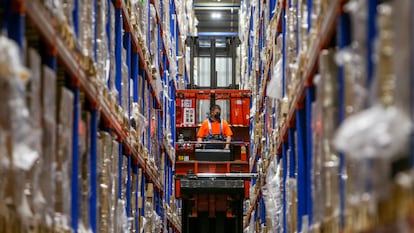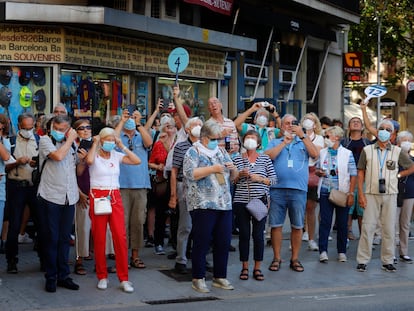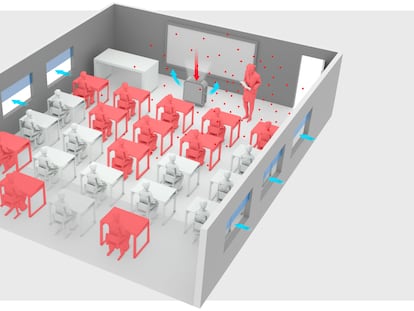Spain delays new shipments of Covid-19 vaccines as immunization drive slows
With doses arriving faster than they can be administered, and four in five residents with at least one shot, the regions are closing down mass-vaccination sites and focusing on strategies to target those aged 20-40


Four in five residents of Spain have had at least one shot of a Covid-19 vaccine. The regions, which are in charge of their immunization drives as well as containing the pandemic in their territories, have more than seven million doses in stock left to administer. Around five million have been set aside for those who have not received a single dose, while two million have been saved to provide the full protection required by the Oxford-AstraZeneca, Pfizer-BioNTech and Moderna vaccines. The Janssen vaccine – the only other approved for use in Spain – only requires one shot.
But the immunization drive has slowed, and vaccine doses are now arriving faster than they can be administered. In response, the Spanish Health Ministry has asked Pfizer to delay a new shipment of vaccines scheduled for September 20. “The regions have an excess of [vaccine] vials, and we have to prevent them from expiring,” said a source from the ministry.
Spain is slowly reaching the point at which it will be very difficult for the vaccination drive to continue to progress. As of Monday, 78.4% of the Spanish population had received at least one dose. But without a Covid-19 vaccine approved for the under-12s, who account for 11% of the population, Spain can theoretically only vaccinate 89% of the country. This figure, however, is likely to be closer to 80% if those who reject vaccines (around 4%, according to surveys), who have concerns about the shots and who have difficulty accessing the healthcare system are taken into account.
Since August 9, the pace of the vaccination drive has been slowing non-stop. Last week 1.3 million doses were administered compared to four million at the beginning of July, when the drive was at its peak. In June and July, the percentage of people receiving their first dose of a Covid-19 vaccine rose by three points every week. Last week, this figure was only 0.8 points.
With the drive slowing, Spain’s regions have begun to close down mass-vaccination sites. In Madrid, for example, the Wanda Metropolitano stadium is no longer being used to immunize the public, while the Basque Country is planning to close all such centers by September 30. At the same time, some regions are strengthening the mobile vaccination points where people can get immunized without a prior appointment. These units aim to vaccinate people “where they are,” Emiliano García-Page, the premier of the Castilla-La Mancha, told Spanish news agency EFE on Monday.
One of the main focuses of these sites are university campuses – a move aimed at targeting young people. The percentage of 20- to 40-year-olds who have received the first dose has stalled at 75% – lower than the figure for the 12-19 population, which is at 80%, even though this age group began to receive their shots at a later date. At the beginning of September, the Spanish Health Ministry also launched an online campaign aimed at boosting confidence in vaccines among youngsters on social-media platforms such as Instagram and TikTok.
In the northeastern region of Aragón, in addition to the mobile sites, authorities are also sending out SMS messages to encourage vaccination or directly scheduling appointments for second shots. Other strategies include reminders by phone call and options to get vaccinated without an appointment.
Debate over third vaccine dose
Last week, Spain approved booster vaccine shots for people with seriously compromised immune systems. This is a different issue to the debate over whether a third dose is needed. In this instance, the goal is to provide full protection to the more than 100,000 people whose immune systems do not properly respond to the vaccine and who remain at risk of contracting a serious case of Covid-19 after two shots.
The World Health Organization (WHO) called last week for a global moratorium on booster doses for the general population until 40% of the world population is fully vaccinated. At an event organized on Monday by the online daily El Español, Spanish Health Minister Carolina Darias said that if this goal was to be reached by the end of this year, more support would need to be given to developing countries. Other nations, however, such as Israel, have ignored the WHO’s request and have started offering third vaccine doses to the over-50 population.
An expert review of scientific evidence to date, published on Monday in the scientific journal The Lancet, found that Covid-19 vaccine booster shots are not needed at this time for the general public. “Current evidence does not [...] appear to show a need for boosting in the general population, in which efficacy against severe disease remains high,” the report found.
Latest figures
The Spanish Health Ministry reported 7,804 new coronavirus cases and added 103 deaths to the official toll on Monday. These figures cover the weekend as no data is released on Saturdays and Sundays. The 14-day cumulative number of cases per 100,000 inhabitants has dropped 15 points to 116.
The more contagious delta variant of the coronavirus now accounts for 94.9% of new cases, according to Monday’s report. This, however, varies between 48% and 100% depending on the region.
A total of 4,652 Covid-19 patients are currently in hospital, a drop of 323 since Friday. Pressure on intensive care units (ICUs) is also easing: 12.8% of ICU beds are occupied by Covid-19 patients, down from 13.37%. In total 4,915,265 coronavirus infections have been recorded in Spain since the beginning of the pandemic, while the official death toll stands at 85,393.
English version by Melissa Kitson.









































